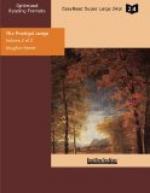In the midst of his angry meditations he heard a clock strike in the hall and counted the strokes. It was nine o’clock. Surely Yancy and Cavendish had been gone their hour! He quitted his seat and strolled restlessly about the house. He felt deeply indignant with everybody and everything. Human intelligence seemed but a pitiable advance on brute instinct. A whole day had passed and what had been accomplished? Carrington, the judge, Yancy, Cavendish—the four men who might have worked together to some purpose had widely separated themselves; and here was the duel, the very climax of absurdity. He resumed his dark corner and waited another hour. Still no Carrington, and Yancy and Cavendish had not come up from the raft.
“Fools!” thought Mahaffy bitterly. “All of them fools!”
At last he decided to go back to the judge; and a moment later was hurrying down the lane in the direction of the highroad, but, jaded as he was by the effort he had already put forth that day, the walk to Raleigh made tremendous demands on him, and it was midnight when he entered the little town.
It can not be said that he was altogether surprised when he found their cottage dark and apparently deserted. He had half expected this. Entering, and not stopping to secure a candle, he groped his way up-stairs to the room on the second floor which he and the judge shared.
“Price!” he called, but this gained him no response, and he cursed softly under his breath.
He hastily descended to the kitchen, lighted a candle, and stepped into the adjoining room. On the table was a neat pile of papers, and topping the pile was the president’s letter. Being burdened by no false scruples, and thinking it might afford some clue to the judge’s whereabouts, Mahaffy took it up and read it. Having mastered its contents he instantly glanced in the direction of the City Tavern, but it was wrapped in darkness.
“Price is drunk somewhere,” was his definite conclusion. “But he’ll be at Boggs’ the first thing in the morning—most likely so far gone he can hardly stand!” The letter, with its striking news, made little or no impression on him just then; it merely furnished the clue he had sought. The judge was off somewhere marketing his prospects.
After a time Mahaffy went up-stairs, and, without removing his clothes, threw himself on the bed. He was worn down to the point of exhaustion, yet he could not sleep, though the deep silence warned him that day was not far off. What if—but he would not let the thought shape itself in his mind. He had witnessed the judge’s skill with the pistol, and he had even a certain irrational faith in that gentleman’s destiny. He prayed God that Fentress might die quickly and decently with the judge’s bullet through his brain. Over and over in savage supplication he muttered his prayer that Fentress might die.




